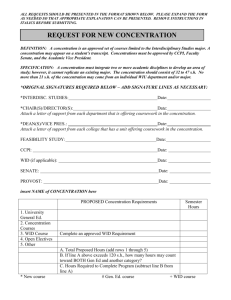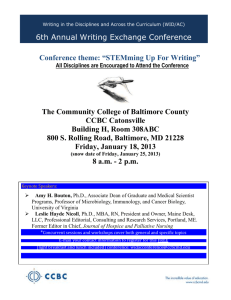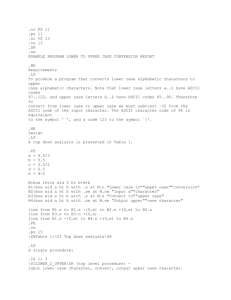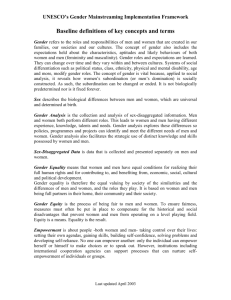Researching the role of the Writing Centre in promoting
advertisement
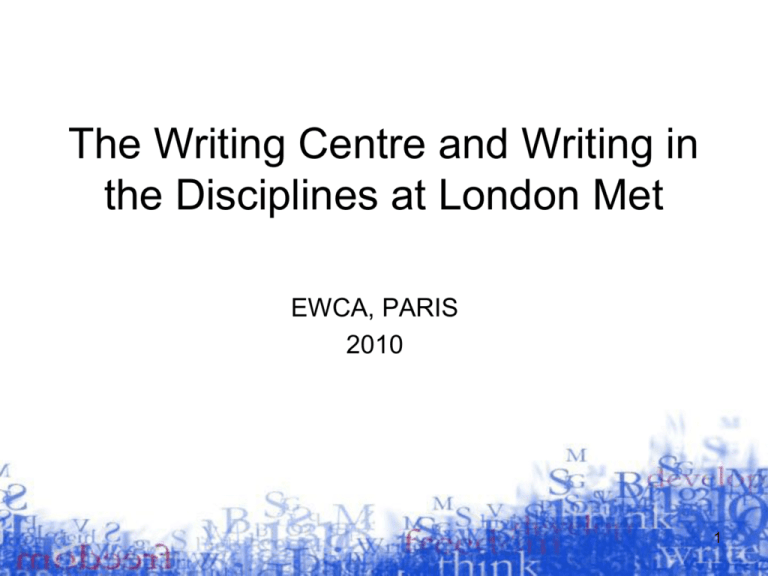
The Writing Centre and Writing in the Disciplines at London Met EWCA, PARIS 2010 1 Writing in the Disciplines • Examine Write Now CETL’s WiD work at London Met (London Met Writing Centre) • Discuss and evaluate a new project to make this work more systematic, sustainable and effective 2 Writing in the Disciplines • Lecturers / Professors take responsibility for students’ disciplinary writing within their disciplinary courses (rather than leaving this to writing/study skills one-to-one tutorials or stand-alone courses or workshops often taught by others) • Writing specialists may collaborate with the lecturer • For all students • Not about remediality but about creating more effective writers in the subject and about using writing to create better thinking and better disciplinary practice • Cf. AcLits on “problems” of student writing as a result of confusions concerning disciplinary demands and epistemologies (Lea and Street 1998) • Wingate (AcLits): real understanding of the complexities of disciplinary writing “can only be achieved within the subject and through explanations, modelling and feedback by subject tutors” (2006: 463) 3 WAC, WiD and Beyond… • Writing across the Curriculum: attempt to use writing outside composition classes and to integrate it within all courses to promote thinking and learning (Bean 2001). McLeod and Maimon describe WAC as “one of the most important educational reform movements of the twentieth century” (2000: 582). • Writing in the Disciplines: focuses more specifically on creating disciplinary writers (including attention to the kinds of writing students will do in their professional life). Cf. Monroe (2002 and 2003). • (Communication across the Curriculum. See e.g. http://www.uncg.edu/cac) 4 WiD at London Met • Write Now CETL: many WiD collaborations • Initial strategy: “work with the willing” • No “master-plan” at the start; collaborations depend on lecturer’s level of interest • Reflect on experiences and try to improve • Major collaborations in first year of CETL with: Psychology, Film Studies, Management and Multimedia. Other more minor collaborations. 5 Lessons learned 2006-09 • Limited point to delivering a “writing workshop” or (worse) a lecture on writing. Unsustainable and despite best efforts divorces writing from the subject. • Best role for writing specialist is to collaborate with lecturer, offering support, knowledge, resources, advice and helping lecturer to assume ownership of writing in their module. This is a process, not something that will happen or be perfected in one semester. • Once lecturers see writing as not a remedial or surfacelevel issue (grammar and syntax) but as the vehicle through which students perform the higher order skills of their discipline (analysing , synthesising, evaluating etc), they are more likely to be interested in owning this aspect of their teaching. 6 Goal for final year of CETL • Build on our experience and create something potentially lasting and sustainable • Put in place a model of WiD which will promote good practice and which doesn’t require huge resources • Make pedagogical research an integral aspect of WiD collaborations in order to raise the status of teaching and learning issues • Put in place a model of WiD which encourages ownership of writing by subject lecturers 7 WiD and “Assessment” at MUOhio • Timely visit by Paul Anderson, Howe Center for Writing Excellence, Miami University, Ohio • Creates detailed writing assessment rubrics in conjunction with MUOhio subject-based professors • Writing diagnostic takes place • Target “weak point” and implement teaching change • Writing diagnostic repeated • More targeting • On-going cycle of evaluation. Incremental improvements. Long-term, sustainable, developmental process rather than a “quick fix”. • Allows Paul Anderson to work with many different disciplines at the same time 8 Paul Anderson’s Cycle of Evaluation 1) USE DIAGNOSTIC TO DEFINE GOALS 2) IMPLEMENT TEACHING STRATEGIES 4) REFINE STRATEGIES 3) EXAMINE STRATEGIES 9 London Met WiD Research Project • Implement a similar model of evaluation which encourages staff to assume ownership of writing and adopts an incremental, process-based approach • Create wider impact in final year of CETL • Offer a sustainable model of writing / professional development at London Met 10 Overcoming fear and resistance: supporting student writing in formal exam settings Dr Debbie Holley London Metropolitan Business School Student fear of examinations “Discussion in class highlighted student fear and apprehension of examinations per se, not the particular examination for the module; and indeed, this fear had inhibited students from even looking at the prepared materials.” Holley & Agombar 2010 The face to-face workshop: • Student attitudes to examinations were collected by questionnaire • around a third of students express concerns about exam writing, and do not consider exams a good way to assess their knowledge. • Most of the students do not want more exam assessments. • A significant minority find exams stressful and find it difficult to write what they want to say in the time allowed. • Only 4 of those completing the questionnaire felt able to perform ‘at their best’ in the exam. Student ‘wish list’ for final resource: • • • • • The final resource was designed to be discipline specific focus on the ‘case study’ (which students identified as the most problematic aspect of the examination paper); be personal to them (their own tutor talking through issues) available 24/7 tracking tools from the previous cohort clearly showed a last minute panic the day before the examination was scheduled! Writing Centre: The resource needed to be reusable in different disciplinary contexts and sustainable. The final resource: http://prezi.com/t6gsdnytc7oj/exam -case-study-pineapples-from-brazil/ What did students think? Student A “I just read your feedback document, I will like to tell you, that I found the exam project extremely useful, as it gives students a very structure way of learning how to answer a question. I really like it, I think that it is an amazing way to help students.” Roger Gossett Faculty of Life Sciences School of Human Sciences Creating an Argument r.gossett@londonmet.ac.uk Background Project Preparation Module Students are good at: Searching the scientific literature Describing the scientific literature Students are less good at: Synthesising the scientific literature Intervention The Project Proposal and Literature Review Explained Historical Context Definitions and terminology Contextualising your proposal Identifying a gap in the literature Theoretical underpinnings The significance of your research question Critical argument – the method Critical argument – contrast of interpretations Critical argument – connecting different source texts Example Arguing for the significance or your research question Conclusion There is tentative evidence of improved writing style in terms of creating an argument Not all students seem to have benefited Improvements and sustainability Working with the Writing in the Disciplines Team of the Write Now CETL at London Metropolitan University Evaluation A small number of students completed each week of the intervention An example of improved writing style that may be attributable to the intervention is: Research carried out by Pratt et al. (1999) proposed that it is inconclusive that sedentary lifestyle causes obesity …. However, Manson et al. (2003) found positive associations … This was confirmed by Hu (2003) who carried out similar research … Case Study Film Studies: Improving Students’ Critical Thinking Using the Blackboard Discussion Tool Dr Rosemary Stott Principal Lecturer in Film Studies London Metropolitan University • Honours level undergraduate • Film Studies • Module Title: New German Cinema Module details • 18 students (14 Film Studies, 3 Journalism, 1 Creative Writing) • 12 weeks teaching (3 hrs per week) • Assessment: 2 critical essays (40% each) + seminar log (20%) Perceived Problems • Critical thinking not deep enough • Existing seminar log template not working because: • reflective writing element did not relate closely to coursework essays • log was ‘private’ and not used as a resource for coursework • students generally not engaged enough with the log Existing Log Template Blackboard Homepage Aims of the intervention • Blended Learning solution • Enhance seminar work via online discussions (blog) on Blackboard (VLE) • Develop critical thinking • Encourage deeper analysis of screenings and readings • Develop new ideas and arguments • To create closer link between seminars and assessments • Desired outcome: improved writing in essays Planning • Threaded Discussions: 2 to 3 topics set up for each week in advance on Blackboard site • Each topic related closely to essay titles also presented at the start of the module • Students encouraged to contribute comments and replies to discussions each week • Online comments used as starting point for face-to-face seminars(student-led seminars integral to Film Studies) • ‘Traditional’ log assessment (20%) replaced by assessment of discussion contributions Discussion threads on each film screening Sample comment Sample comments and replies Positive Outcomes • Reasonable student engagement (carrot and stick approach!) • In most cases, provided an orientation for the student-led seminar • Quiet students did contribute well • Increased collaboration between students • Feedback – students preferred it to the existing seminar log template • Some evidence of deeper thinking in the assignments Problematic issues • Not all students contributed regularly • Rush of contributions towards the end of the module (defeated the purpose) • Some problems encountered with Blackboard when uploading images Adjustments needed • ‘Hands-on’ training session to accustom students to the discussion tool • Blog comments need to be integrated more into the student-led seminar • Need to address disability (could dyslexics use sound as well as image files?) • Award marks for regular contributions? Project findings Staff change • Role of reflective practitioner taken seriously and evidence of continuous development • Research into practice, publications, conference and other presentations • Writing perceived as a process, which was mirrored in individual approaches to developing own students’ writing • Practical changes made to module design and delivery • Future plans for continuing and extending the changes – to one’s other modules – across the department/faculty more widely • Importance of working with individual, committed lecturers • Lecturer taking on role as a local champion of WiD 37 Project findings Staff reflection on this form of professional development • Viewed very positively and experienced as having several uniquely beneficial aspects – – – – personal conversation: intensive and helpful, but not too time-consuming encouraged own thinking and empowered lecturers to make changes targeted to actual concerns and specific problems being part of a “project community” with occasional meetings provided support and exchange of ideas that would not have taken place otherwise – enabled a constructive focus on pedagogy instead of just subject content – more effective than a general staff development workshop – participation in research attractive; helpful to see that student writing is an area of academic study in its own right 38 Project findings Student writing and learning • Evidence of increased participation and engagement with module content and learning activities amongst most students, including those lacking confidence as writers • However, increased engagement did not consistently carry over into improved writing in assessed work • General tendency for more marked improvement in writing quality amongst already stronger students • Some students reluctant to engage in collaborative and public writing tasks (e.g., blogs, in-class writing), and in general these students were the least likely to show writing or learning improvement 39 Taking the project further Possible directions for 2010-11 • Planned and systematic expansion across departments, facilitated by staff with positive experiences of embedding WiD in their own modules • Explicit targeting of specific modules for highest impact, e.g., first year, large number of students, low pass/progression rate 40 Writing Centre • A place where such work can be carried out and recognised • Disciplinary peer tutorials (London Met Writing Mentors Scheme) to support lecturers (2000 one-to-one tutorials 200609; with over 950 held last year) • But staff development, learning development and language centres could also be units for carrying out WiD work? 41 AcLits and WiD – Is WiD an effective vehicle for promoting attention to AcLits? – Does WiD perhaps neglect the critical dimension essential to AcLits thinking? AcLits and WiD • AcLits: so far in large part a theoretical approach. Cf. Lillis: “Academic Literacies has been highly generative as a critical research frame, challenging many common-sense assumptions about what is involved in student writing and foregrounding the limitations in much current writing pedagogy. However, as a design frame it has yet to be developed. I am using ‘design’ here in the broad sense of the application of research findings and understandings to pedagogy” (2006: 33). • WiD perhaps is more pragmatic? Reflect on the issue. Do something. Reflect and do it again differently? Cf. Action Research. • Lillis suggests that the pedagogical outcome of Academic Literacies is likely to be dialogues between student-writers and tutor-readers which “enable participation in dominant academic literacy practices as well as provide opportunities for challenging aspects of such practices” (2006, p.33). Cf. writing mentors’ scheme. Does WiD encourage this dialogic approach or does it perhaps reinforce dominant practice, seeking to help students master the conventions but perhaps being less interested in challenging how things are done? • Or does this depend on the goals and interests of the lecturer? 43 44
